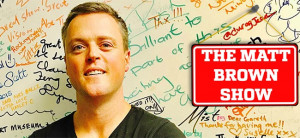
Matt Brown is an entrepreneur, speaker and the host of the Matt Brown Show - a global media platform and podcast that built a loyal listenership in over 100 countries in only 18 months. He is also the CEO of Digital Kungfu, a strategic business consultancy that specialises in helping companies navigate change through accelerated innovation and disrupting the traditional markets. This enables them to do business in new ways and to serve their customers more effectively and responsively.
He has 20 years' experience in business strategy, technology and marketing communications and his podcast (The Matt Brown Show), has hosted billionaires, entrepreneurs and the CEOs of some of South Africa's most successful companies.
Brown is the keynote speaker at the upcoming ITWeb Digital Economy Summit, Focus Rooms, 7 and 8 November 2017. His message is clear: 'If your competitive reality is uncertain and rapidly changing, you need a dynamic and sustainable way to stay ahead. The key to growth - even survival - is to unlock a new competitive advantage'.
ITWeb Events: As the keynote speaker at the Digital Economy Summit in November 2017 your presentation is focused on how exponential tech is changing the shape and future of business - what are the three key reasons/drivers for/of this change in your opinion?
Brown: There are three primary drivers, digital technology continues to penetrate all aspects of our lives. We are, after all, living in the Fourth Industrial Revolution. Tech has never been more affordable, but the capabilities of our technology (take cloud computing for example) has exponentially increased. Secondly, consumers and particularly Generation C, are already fully adapted to the digital environment. Lastly, the economic benefits to be captured through digitisation are real. The freelancing market in the UK contributed 109 billion pounds to the UK's GDP last year. That is more than the entire automotive industry combined. The ability to scale at a fraction of the cost has seen a wave of capital being poured into new digitisation technologies, and the public markets reward early movers with unprecedented valuations.
ITWeb Events: Why are businesses being disrupted? What is the first thing that every business should do before they embark on the digitisation journey?
Brown: Disruption is a word loaded with meaning: an interruption, break or severance. Put the word in the context of the technology industry, and it stands in nicely for the incredible impact a new approach can have on the status quo.
Done right, IT strategy and leadership can catapult growth; done wrong, the corporate bottom line isn't the only thing that suffers.
The most disrupted industries typically suffer from a perfect storm of two forces. First, low barriers to entry into these sectors lead to more agile competition. Secondly, they have large legacy business models which often generate the majority of their revenue. These organisations, therefore, have embedded cultural and organisational challenges when it comes to changing at the pace required. I
It is important not to look at disruption in isolation - it has to be looked at in the context of innovation too or "disruptive innovation".
This is the enabler of scalable business value and always has the greatest impact when focused either at a product or business model level. Disruptive innovation may seem scary - ?but it shouldn't be. It's important to take a simple small step first, invest a little and learn a lot.
It is possible to move forward in a manner, which doesn't require huge amounts of capital and doesn't require huge amounts of risk.
ITWeb Events: You mention in your precis that the 'key to growth is to unlock a new competitive advantage' - why is this an imperative? And how do the traditional, large and 'financially sound' organisations remain competitive?
Brown: Exponential technologies promise to enable companies with new way to do business or to simply stop doing something old and in the process of doing so create new ways to serve their customers better and faster.
In the future, the companies that will be the most competitive will come down to two things: the ability to out and innovate the competition, and then market those innovations to the customer. The ability to set up new innovation lead organisational structures so as to avoid the corporate anti-bodies and to overcome inertia need to be considered and a philosophy of fail fast and fail forward has to be adopted.
ITWeb Events: Which three technological advances do you think will impact on the way we 'currently' do business?
Brown: The blockchain is the arguably the most disruptive invention since the creation of the Internet itself, but the irony is that many entrepreneurs, start-ups and business executives do not understand the magnitude of the impact that this technology is going to have on the world as we know it. So why is this the case? Well, it can replace all processes and business models which rely on a small fee for processing transactions. And that means a revolution is coming, a fundamental shift in the way we do business.
AI can already create its own language, write its own code and beat the world's best players of Go, which has more possible moves than stars in the universe, and poker, which is more impressive simply because the AI had to read facial expressions and emotionally driven queues. This is just the beginning of what we will see in this space.
Many people say that IOT is coming but to be honest it is already here. The ability to combine a network of billions of sensors and associated data to unlock new efficiencies and insights from the value chain are unprecedented.
ITWeb Events: Why did you say yes to presenting at the upcoming Digital Economy Summit? What is it that you bring to the table and what do you want attendees to take away with them after your presentation?
Brown: I want attendees to understand that what works today, will not work in the near future.
Share